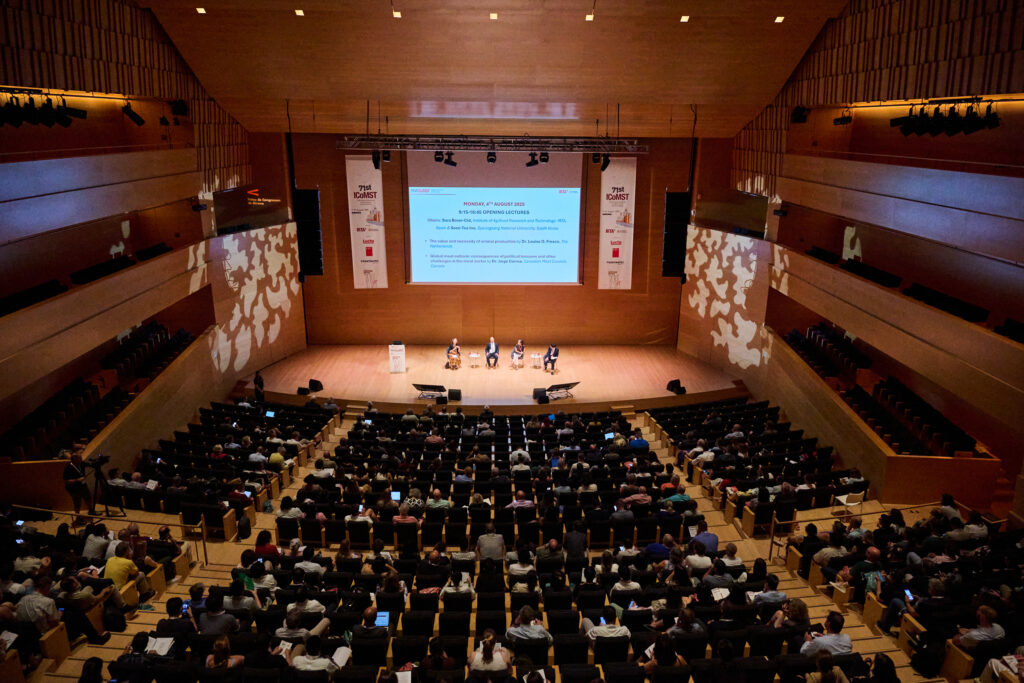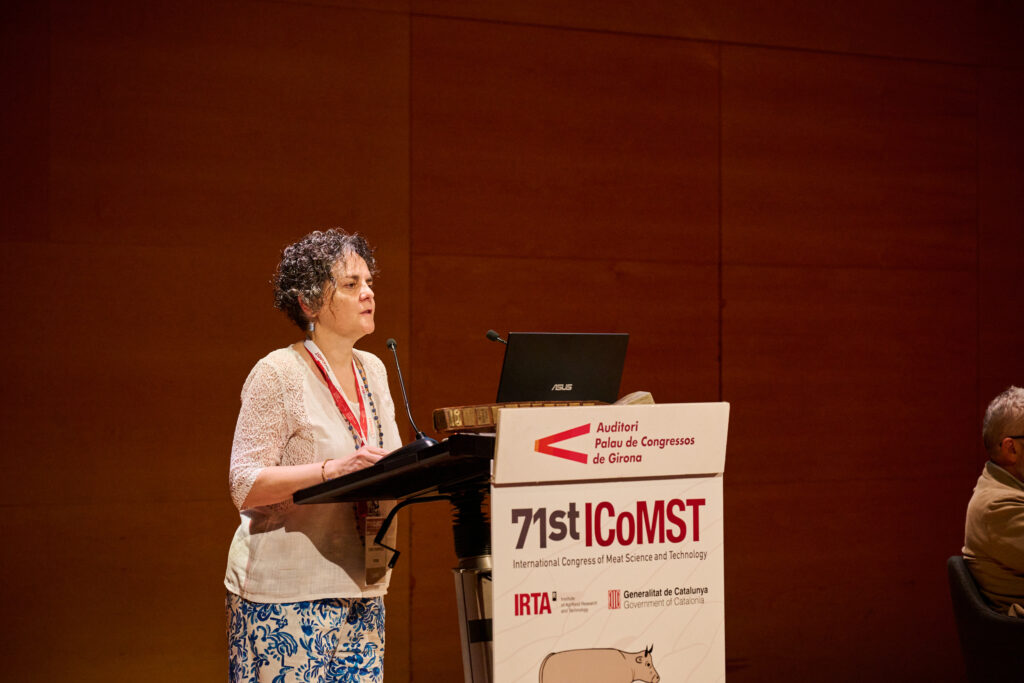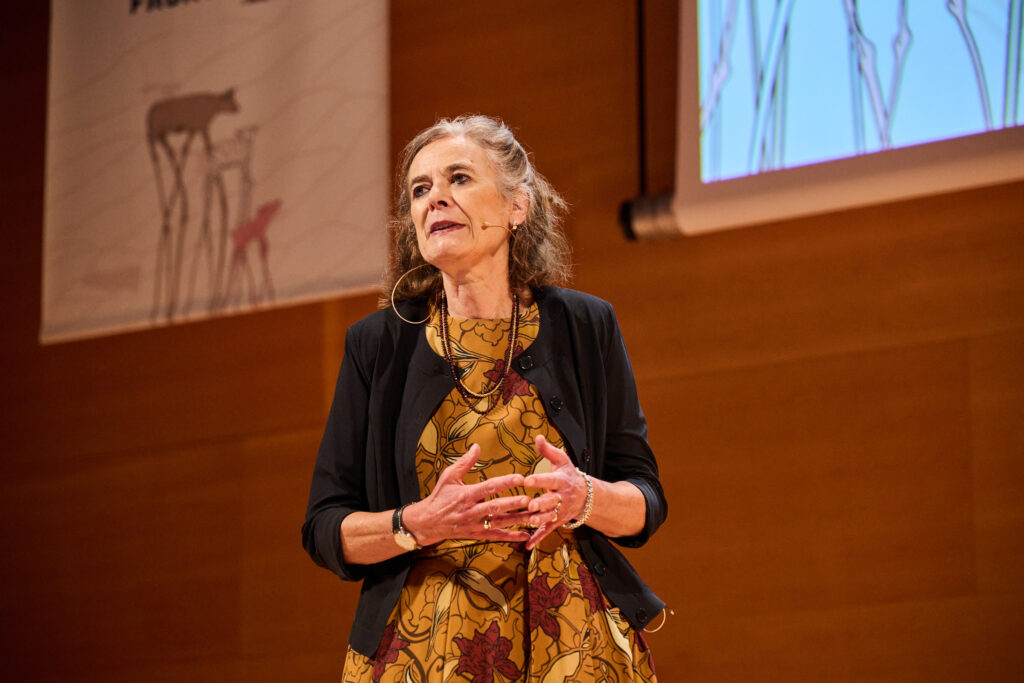A conference on the role of animal production in the sustainability of food systems, and another on the effect of geopolitical tensions on meat marketing, opened this Monday the 71st edition of the International Congress on Meat Science and Technology (ICoMST), the world’s leading scientific meeting in the field of meat, organized this year by IRTA (Institute for Agrifood Research and Technology) and held at the Auditori Palau de Congressos in Girona throughout the week. ANAFRIC is present and participates as the organizing committee.

At a time when major global challenges, such as climate change, digitalization, and international competition for resources, are setting the agenda for food systems, the congress brings together half a thousand experts from research centers, universities, and companies from around forty countries until Friday to analyze and map out the future of the sector.
Under the motto “Real meat, real care,” this year’s edition aims to highlight authentic, high-quality, safe meat produced with respect for animal welfare, the environment, and society. For this reason, over the course of these days, topics such as environmental sustainability in meat production, the most innovative trends in the meat industry, how animal welfare improves product quality, and consumer preferences will be addressed, as outlined in the conference program.
The inauguration of the ICoMST was attended by several representatives of Girona institutions, including Xavier Aldeguer Manté, Fourth Deputy Mayor for Talent, Innovation, Health, and Community at Girona City Council, and Gemma Geis i Carreras, Second Vice President of the Girona Provincial Council. The event was also attended by IRTA Director General Josep Usall i Rodié, who stated that “the meat sector faces the challenge of preserving tradition and, at the same time, researching and innovating for a sustainable future.”
IRTA, a Long History in Meat Science
Usall also highlighted IRTA’s long history of meat research and innovation, closely linked to the region and the sector, which the organization has carried out since its inception forty years ago.
“At IRTA, we work to ensure the production of quality, safe, and sustainable meat, studying everything from animal genetics and nutrition to meat classification using cutting-edge technologies, reducing greenhouse gas emissions on livestock farms, and producing biogas. We are also firmly committed to animal welfare and want to demonstrate how it positively impacts meat quality,” he explained.
For her part, the conference president, Maria Font, a researcher in IRTA’s Food Quality and Technology program, explained that more than 350 scientific presentations will be held this week, as well as two days of networking with the industry. “In addition, on Wednesday we will leave the Auditori Palau de Congressos to visit several Catalan companies in the meat sector and showcase the culture and heritage of Catalonia and Girona to our colleagues from around the world,” she added.

Circular Economy and Geopolitics
The opening presentation was given by Louise Fresco, former Deputy Director General of the FAO and a member of IRTA’s Scientific Advisory Council. Fresco highlighted the key role of meat in human existence, since, as she noted, the beginning of its consumption contributed to brain growth, while hunting made collaborative work essential. She also highlighted the nutritional value of meat for certain population groups, such as pregnant and breastfeeding women, children, and the elderly.
For the former FAO Assistant Director-General, the sector’s main challenges include halting deforestation for animal feed production; minimizing greenhouse gas (GHG) emissions; continuing to make progress in animal welfare; and maximizing the use of all animal products. “You can’t generalize about the way we produce around the world, but there is a basic law, which is the optimization of resources,” she stated. Digitalization is an opportunity in this regard, she added. She also stated that we cannot talk about the circular economy without including animals.
In fact, IRTA researcher Ricard Bou spoke at the meeting This morning, Bou discussed the utilization of meat by-products, such as brains, livers, and kidneys, which are rarely consumed by humans. Bou explained that these organs can be processed and used for biomedical and pharmaceutical purposes, as well as to obtain ingredients for both human and animal food. He also gave as examples the multiple uses of collagen, which is used to manufacture a large number of biomaterials.

In fact, IRTA researcher Ricard Bou spoke at the meeting about the utilization of meat by-products, such as brains, livers, and kidneys, which are rarely consumed by humans. Bou explained that these organs can be processed and used for biomedical and pharmaceutical purposes, as well as to obtain ingredients for both human and animal food. He also gave as examples the multiple uses of collagen, which is used to manufacture a large number of biomaterials.
Effects of tensions and wars
Likewise, Jorge Correa, a researcher at the Canadian Meat Council, participated in the opening of the conference and referred to the major challenges of the global meat trade, including the effects of geopolitical tensions and wars. Correa noted that the meat market is valued at $1.45 trillion and employs 2.2 million people, but emphasized that jobs are precisely one of the sector’s greatest challenges: “We need workers, and our meat industry isn’t sexy.” In fact, the social perception of meat production and consumption was also a central theme in the questions posed by attendees to Fresco and Correa, and will be a topic addressed throughout the conference.
The ICoMST will close on Friday with a roundtable discussion on the future of the meat sector and research. Representatives of the Dublin Declaration and Denver Call to Action will participate. These organizations advocate for sustainable livestock farming and its social role and, above all, call on governments to base their decisions on the most scientific evidence.
















